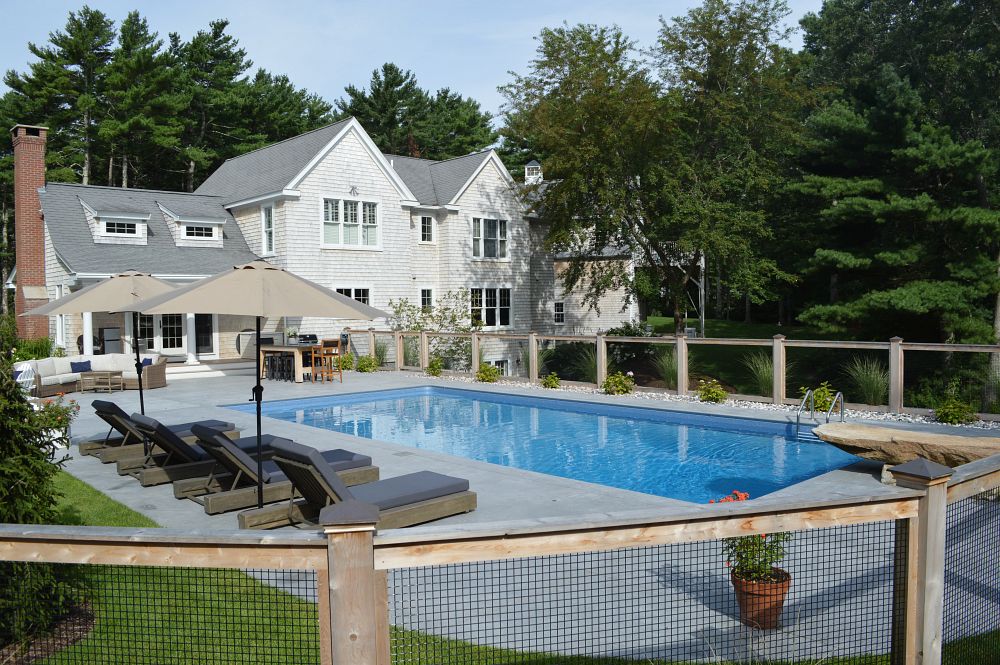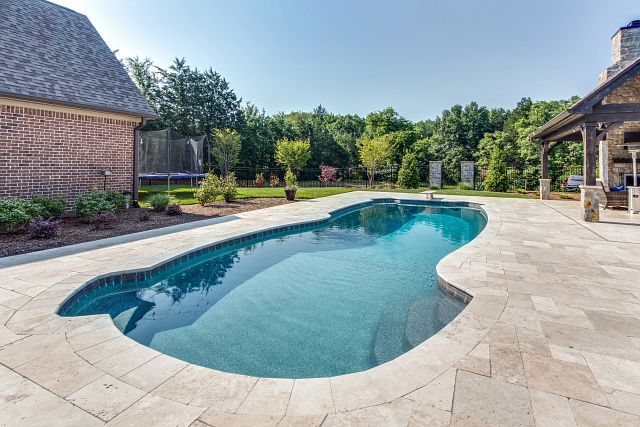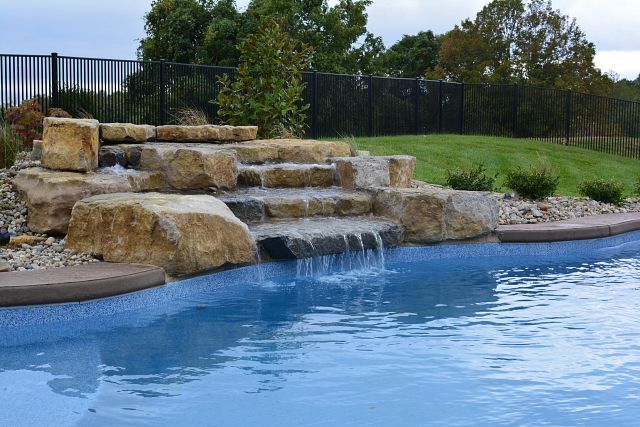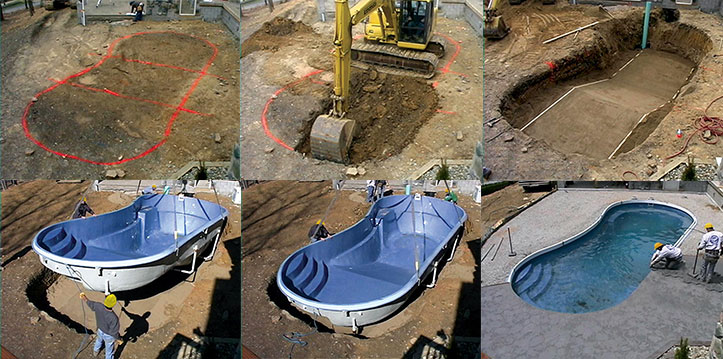Recently ranked as “the best state in America” by WalletHub, the only thing that could make living in Massachusetts even better is a pool. Although Massachusetts residents are no strangers to cold New England winters, it’s possible to get a lot of mileage and enjoyment out of an inground pool in your backyard.
Regardless of where you live in The Bay State, MA residents have a variety of options when purchasing a new pool. But your pool itself is only part of the package. Think about how your pool will work with decking, landscaping, and other features to transform your backyard into a relaxing oasis. You’ll also want to consider practical accessories, such as an automatic pool cover, which can minimize maintenance and help you save on energy costs, as well as a winter cover to protect your investment when harsh Massachusetts winters set in.
Most importantly, you’ll want to think about how you plan to use your pool and how it will enhance your lifestyle. If you live in Massachusetts and are thinking about purchasing an inground pool, we’ll guide you through why you may lean towards either a fiberglass or vinyl liner pool, maintenance tips, and several important state and local regulations surrounding pool ownership in MA. Let’s dive in!
Fiberglass Pools for MA
Fiberglass pools offer a smooth, glossy finish that’s a treat for your feet when wading. Better yet, because fiberglass pool shells are manufactured off-site and transported into an excavated area in your backyard, they can be installed faster. Not only does this speed up your pool’s installation time, but it means you can maximize your pool time and start enjoying it sooner.
Fiberglass pools are also strong, durable and easy to maintain. Because fiberglass pool shells are smooth, they’re less prone to developing algae bloom and calcium deposits compared to materials like concrete or gunite with a rougher surface that algae can more easily cling to. They also require considerably less upkeep, which means you get to spend more time playing in your pool instead of cleaning it.
Learn more about the benefits of owning a fiberglass pool.
Inground Fiberglass Pool Designs for Massachusetts
When pool fever strikes, you probably have a clear visual in mind for what your dream pool may look like. Jessica France of Snyder Pools in Massachusetts has observed recent trends that “rectangular pools are becoming more popular than freeform shapes. Homeowners are asking for clean lines and a symmetrical look. The [rectangular] Monaco and [freeform] Laguna have been our best sellers. And while Ocean Blue and Sapphire Blue continue to be the most popular color choices for fiberglass pools, we are seeing increased interest in Shale Gray.”
While it’s true that fiberglass pools come in a variety of shapes, sizes, and colors. However, when it comes to pool design, choosing a shape is just one part of your project. How your pool works with your lifestyle and fits into your backyard itself are other major factors to consider.
When planning your pool, think about how – and who – will use it:
- Do you have young children or teens?
- Will they bring friends over to use the pool?
- Will seniors or mobility compromised individuals use the pool? What amenities might they need to be able to use it safely?
- Do you enjoy entertaining? How many people do you typically have at your backyard get-togethers?
- Do you plan to use your pool for exercise, relaxation or both?
Asking yourself these questions can help you design a pool that works for your wants and needs – as well as those of friends and family you invite to use the pool, too!
For instance, if small children, seniors or mobility-compromised individuals will use your pool, safety features like multiple access points and non-slip steps may be at the top of your pool wish list. You might also want to consider pools with shallow wading areas for young swimmers to splash and play.
Adding an autocover to your pool package can also serve as a convenient safety barrier to prevent kids from using the pool unattended or accidentally falling in.
You’ll also want to consider how your property layout supports the design of your pool. Consider how your pool will work with the size of your yard, landscaping features and any required fencing or decking.
At first, you may have your heart set on a particular shape or style of pool. However, after you talk with an independent pool builder, you may realize that a different shape or size may work better with your backyard and how you plan to use your pool.
Whatever your style or aesthetic may be, Latham can make it work with any state or local pool requirements. Below, you’ll find some gorgeous examples of pools we’ve built throughout the Bay State. While these can serve as a springboard for bringing your Massachusetts dream pool to life, keep in mind that just because you don’t see a picture, that doesn’t mean it’s not possible! Contact a local independent builder to see even more photos and videos of pools in their portfolio and get inspired!
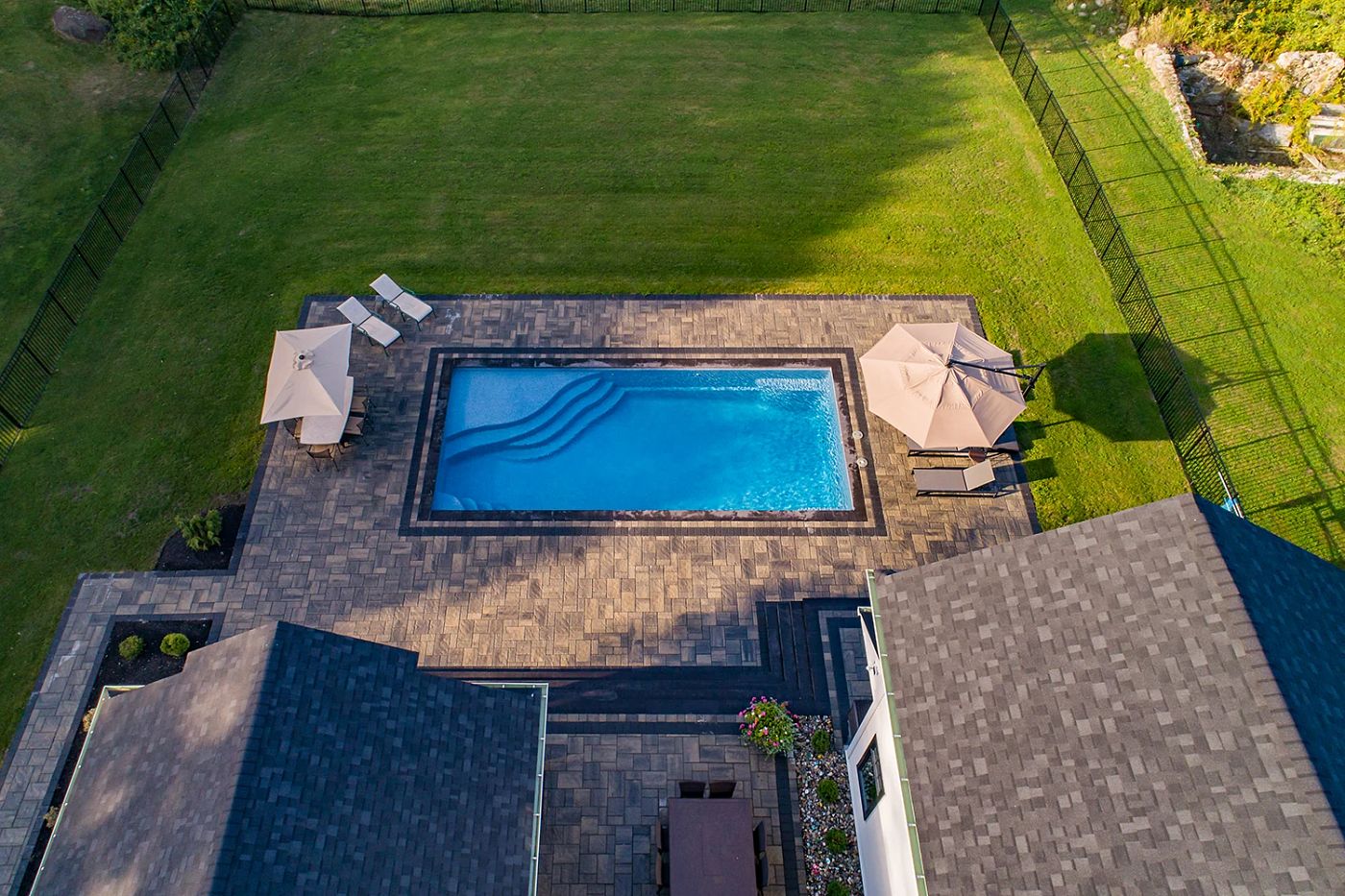
Considerations for a Smaller Pool
Good things come in small packages! Even if you have a sprawling backyard, there are many reasons why Massachusetts residents may opt for a more compact fiberglass pool vs. a larger pool.
Given the Bay State’s northeastern positioning and colder climate, pool owners may want to add a heater to squeeze in every possible moment of pool time throughout the year. Smaller pools mean less water volume to heat, saving on energy usage and costs. And while fiberglass inground pools are low-maintenance, a smaller pool still means less area to skim – especially if you live in a heavily wooded area or your backyard is lined with trees.
If you live in a densely-populated area like Lowell, MA and have a smaller backyard, or if you live in areas like Boston and Weston that have a higher cost of living, a smaller pool delivers a lot of fun into a smaller – and less expensive – package.
Kidney-shaped pools like the 10’ x 20’ Jamaica are small and stylish – not to mention loaded with features perfect for entertaining or relaxing. The Jamaica has ample swim-up seating that can double as a “beverage bench” for a lively afternoon in the pool with friends, as well as slip-resistant steps.
For a smaller-sized freeform pool, the 12’ x 26’ Bermuda is another popular option with Massachusetts residents. With slip-resistant scalloped corner steps and plenty of swim-up seating for your entertainment pleasure.
The sleek, symmetrical styling of rectangular pools has also proven to be a big hit with Massachusetts pool owners in recent years. If you crave classic lines, but in a smaller size to accommodate your backyard, eye up the Enchantment 9.17. It has a built-in tanning ledge that can double as a wading area for little swimmers. The Enchantment’s easy-access steps also make it a fantastic option for individuals with mobility issues to enjoy the pool, too.
The Milan is another fun-filled small rectangular option. This 10’ x 16 plunge pool features ample room for swimming laps and water-based exercise, as well plenty of space to float with a cool beverage in-hand after a long day at work.
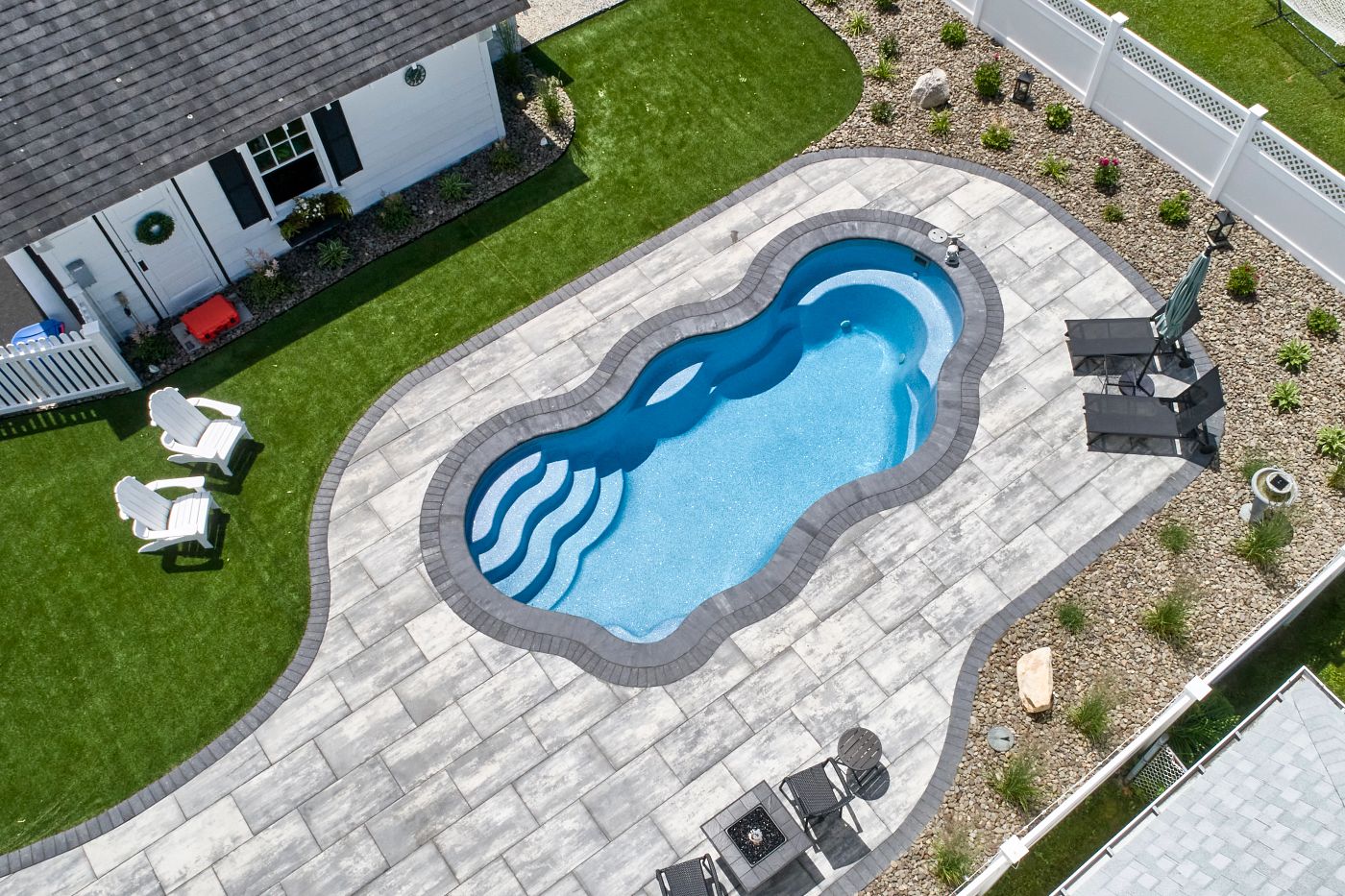
Considerations for a Larger Pool
If “go big or go home” is your motto – and your backyard has the square footage to back it up – you have virtually limitless options for pools to grace your space. Bay State residents in Western Massachusetts can count themselves among those lucky enough to have a wider stretch of space to accommodate a larger pool.
When weighing your options, think about your own personal aesthetics and any natural features of your backyard that you want to play up. For instance, if you have beautiful trees surrounding your property, a large rectangular pool – like the spacious Monaco or the midsize 14’ x 30’ Olympia 14 – can be a great selection that not only reflects the picturesque scenery on its shimmering surface, but gives you ample room to add features like pool lights, bubblers and cascading fountains to enhance the fun factor.
On the other side of the coin, a larger freeform pool like the Axiom 14 can work with a larger backyard, mimicking the look of a flowing, natural stream. While the Axiom 14 offers a back-to-nature look, it’s also made for entertaining. Swim-up seating and a beverage bar make it a great place for friends to kick back poolside. Its generous underwater tanning ledge offers a prime place to lounge without fully submerging yourself.
If large and luxurious is your thing, look no further than the feature-rich Cancun Deluxe. Once you’re done swimming the length of this extravagant 16’ x 35’ inground fiberglass pool, you can enjoy a soothing soak after dark or during chilly fall months in its built-in spillover spa.
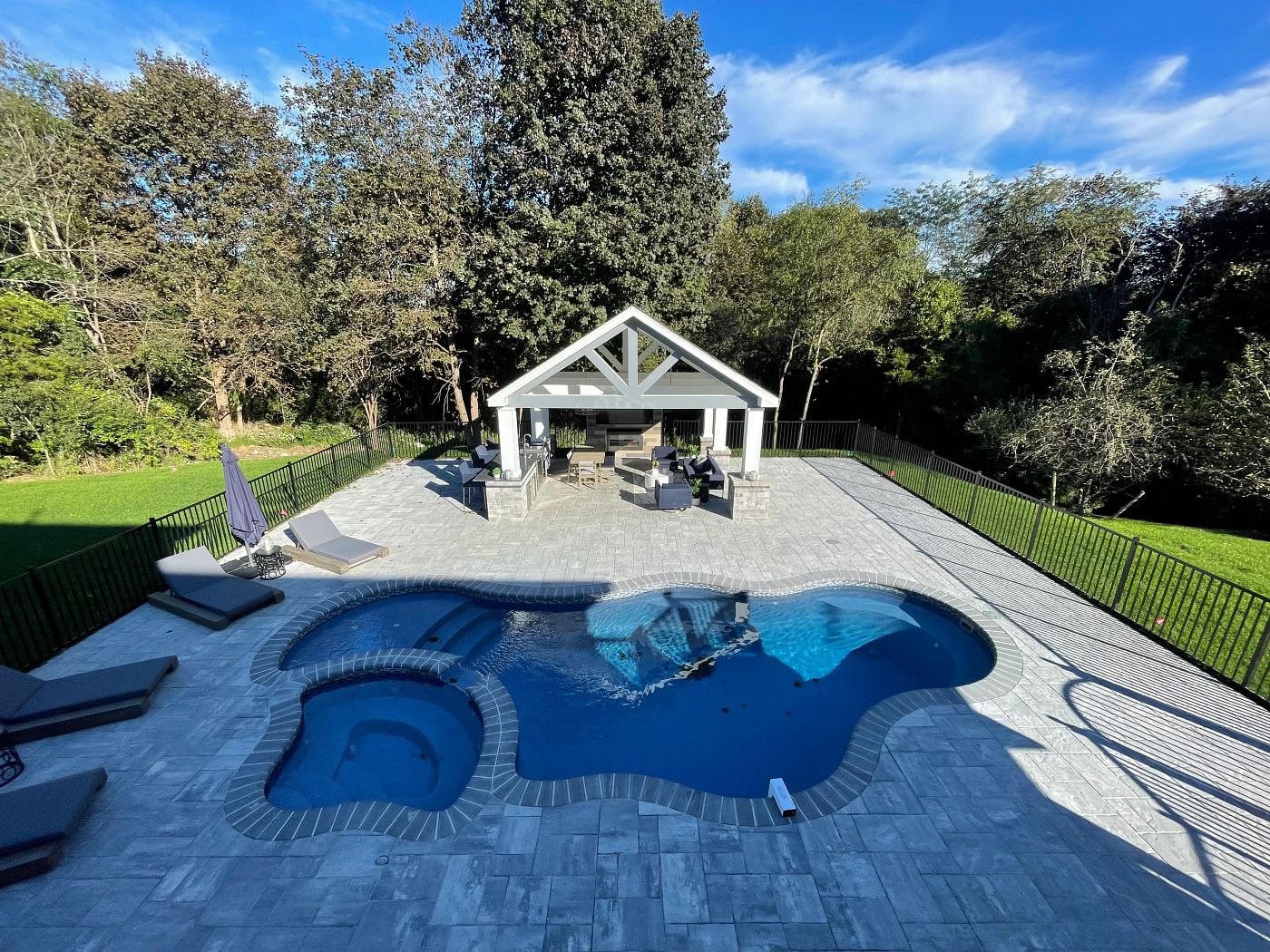
Pools for Irregular or Sloped Yards
Massachusetts is home to gently rolling hills and valleys, which can sometimes make for sloped or irregularly shaped yards. If your backyard fits into either of these categories, there are still plenty of beautiful fiberglass pools that can fit any unique property constraints. Freeform and kidney-shaped pools are just a few options to consider.
These pools differ slightly from model-to-model, allowing you to find one that fits the unique shape and contours of your yard. For instance, the modern freeform Genesis is more narrow at 16’ wide, but has a longer 40’ width. For smaller irregularly shaped yards, a traditional freeform model, like the 12’ x 25’ Freeport or the 12’ x 24’ kidney-shaped St. Lucia can fit the bill.
Enlisting the expertise of a professional builder can help you find a pool that works with your aesthetic, as well as your yard itself. And while the vast array of fiberglass pools come in an assortment of shapes and sizes with tons of built-in features, remember that your builder can further customize your pool with add-ons to make your wildest pool dreams come true.
Customization is truly the name of the game when it comes to backyards that aren’t level or that sit on sloped terrain. In some cases, a licensed professional builder can grade your land to accommodate a fiberglass pool. However, there may be some instances where a vinyl liner pool may be a better fit, giving you more flexibility to design a pool that better works with the limitations of your property compared to prefabricated fiberglass pool shells.
Vinyl liner pools come in many of the same beautiful shapes and models as their fiberglass counterparts, and can be further customized with features like tanning ledges, bubble jets and spillover spas. Ultimately, the goal is a well-designed pool that works with your property and can give you years of enjoyment with friends and family – all from the comfort of your own backyard.
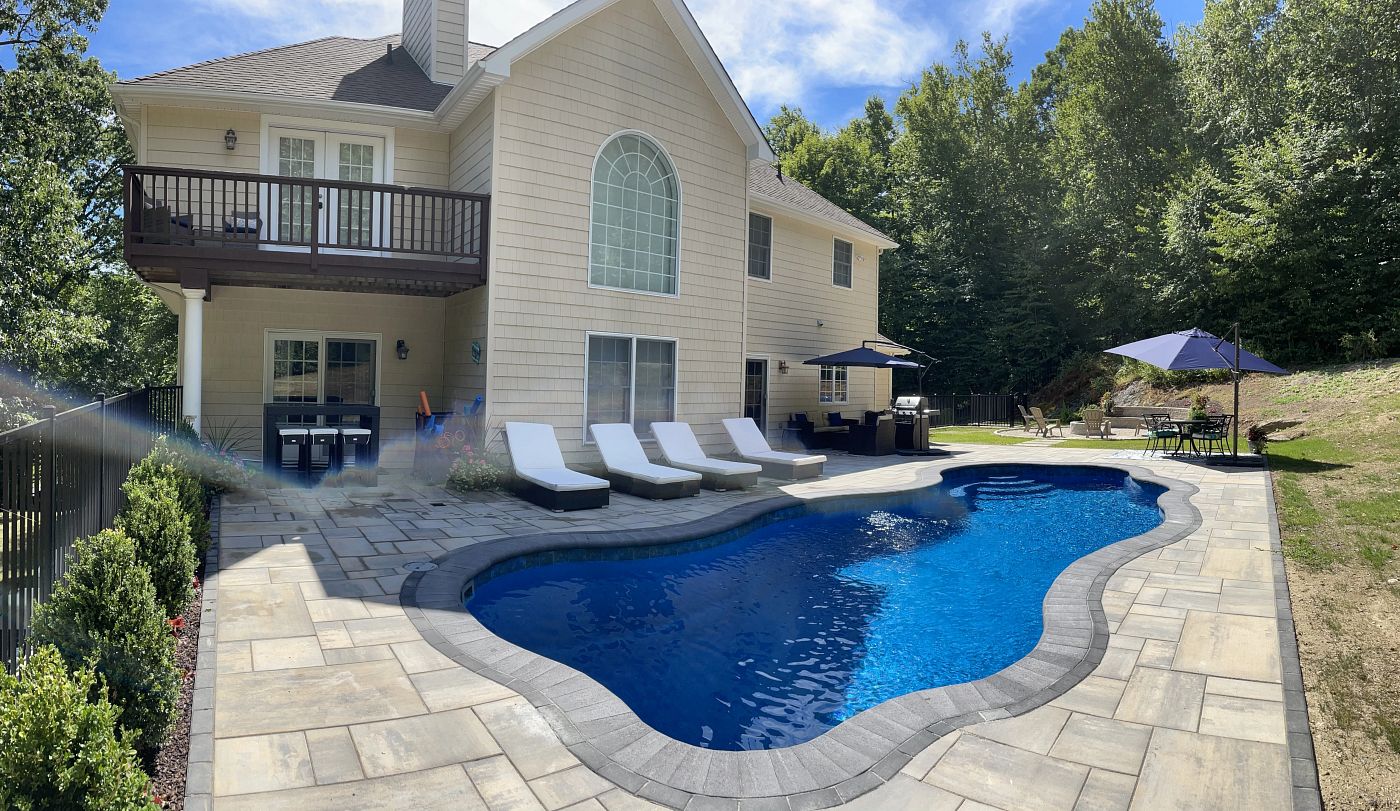
Inground Vinyl Liner Pools in MA
Inground vinyl liner pools are another popular choice for Massachusetts pools. They’re known for their durability, ease of maintenance, and can be a cost-effective option. Even better, vinyl liner pools are highly customizable. A well-maintained vinyl liner can last roughly 10 years, but you can replace it sooner to refresh the look of your pool on a budget. Vinyl liner pools are also an affordable option for refurbishing older concrete pools.
Vinyl Liner Pool Designs for Massachusetts Homes
Vinyl liner pools can be another attractive – and affordable — option for Massachusetts homeowners. While there are a wide variety of vinyl liner pool shapes and sizes, vinyl liner pools lend themselves to even more flexible customization options. Your builder can work with you to design a vinyl liner pool that incorporates features that work with your needs.
Add-ons like a tanning ledge and multiple entry points can make your vinyl liner pool fun and accessible to younger swimmers who get tuckered out easily or for mobility compromised individuals. Additionally, because vinyl liner pools are poured into place, they can be an excellent choice for homes that have irregularly-shaped or uneven backyards.
Remember: even if you don’t see your ideal pool here, local builders can share more photos and videos of custom vinyl liner pools in their portfolio.
Benefits of Vinyl Liner Pools for Massachusetts Homes
While fiberglass pools have a reputation for reeling in homeowners with their smooth, crystalline appearance, don’t sleep on vinyl liner pools! These pools offer considerable benefits, chief of which is their affordability and that they require relatively minimal maintenance.
Flexible Designs for Any Lifestyle
Although there are a huge number of pre-existing vinyl liner pool designs in all shapes and sizes, you can work with a builder to fully customize your pool. A licensed professional builder can design your pool to incorporate practical elements like tanning ledges, custom stairs and multiple entry points. They can also outfit your pool with a dazzling array of features to enhance the fun factor of your pool. Think water slides, water features and colorful pool lights to transform your pool into a one-of-a-kind backyard oasis everyone can enjoy.
Vinyl liner pools can be tailored to suit your lifestyle and to help you live your best backyard life, whether you live in a crowded urban area or have a spacious backyard nestled into the New England countryside. For instance, vinyl liner models like the Gemini come in small, medium, large, and extra-large sizes – making it a striking kidney-shaped option that can work with just about any backyard. Using a base model as a springboard, your builder can add custom features to your pool before applying its vinyl liner over the structure for the perfect finishing touch.
That brings us to liner colors and patterns. Your liner is what gives your pool its gorgeous color and soft-to-the-touch feel. Latham offers one of the widest selections of vinyl liner options, giving you even more room for customization.
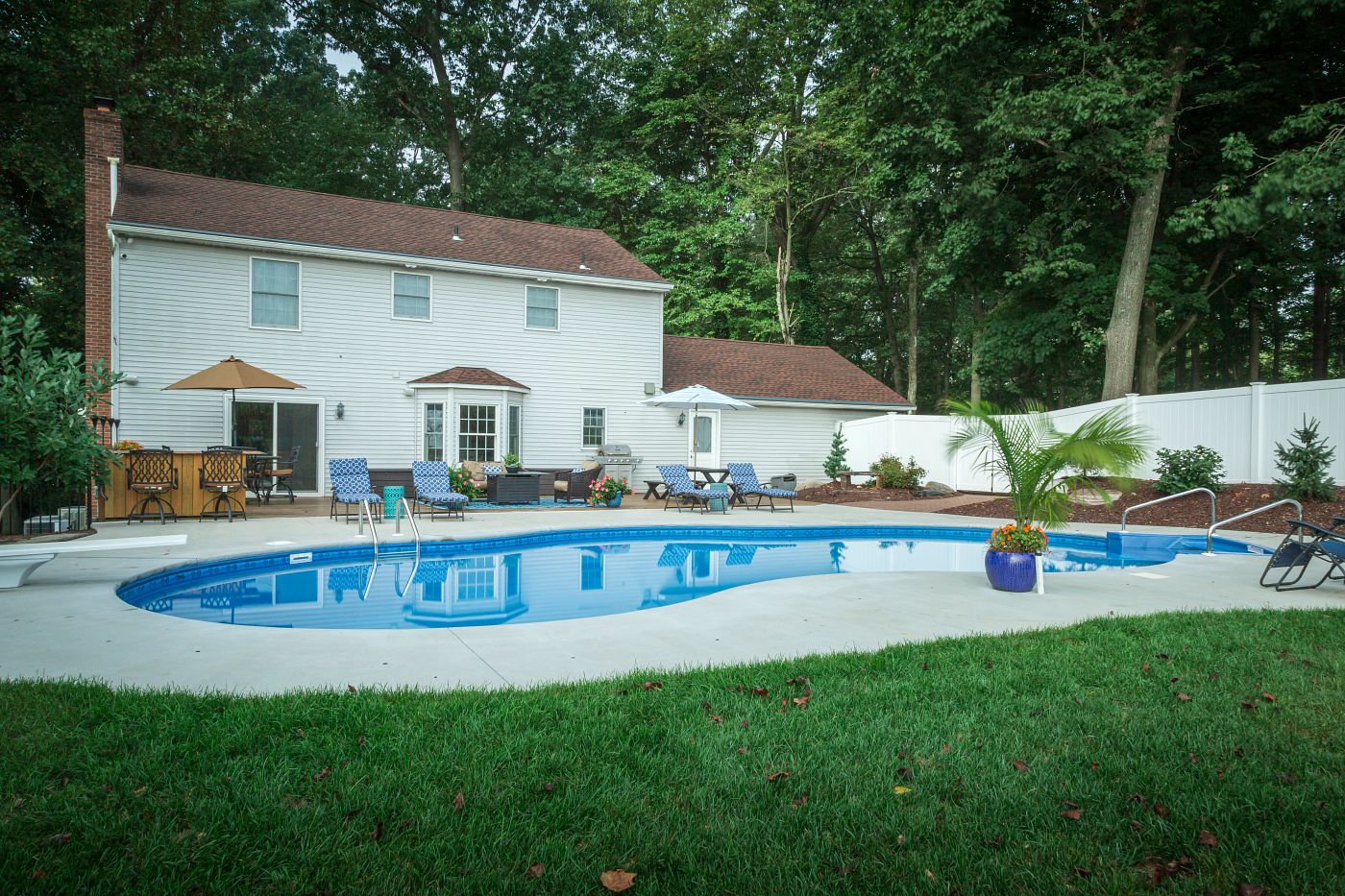
When should you replace your vinyl liner or update your pool?
Massachusetts residents are no strangers to long, harsh winters. If you own an older concrete or gunite pool, New England’s famed cold snaps can take a toll on your pool, accelerating its aging process and compromising its structural integrity. Over time, this can translate to more wear, tear and repair on an older pool, which can be a financial drain over its lifetime.
Concrete pools can also become rough with age. Because concrete is porous, these pools can more easily develop pool algae. Not only can algae leave behind unsightly stains on your pool’s surface, but it can make it more difficult to balance its water chemistry. This means more time spent taking care of your pool and less time enjoying enjoying it
Vinyl liner pools can offer a more economical option to replace an older concrete pool. Not only do they require less maintenance than concrete, but offer greater potential for customization. Over time, you can add or subtract features to your vinyl liner pool, depending on what you want to get out of it. In addition to replacing an older pool that requires added cost and upkeep to maintain, lifestyle changes can also signal when it’s time to renovate an older pool.
For instance, if you have young children and want to transform your backyard into an at-home vacation spot, thrilling water features and slides might top your list of customized add-ons for your vinyl liner pool. However, once the kids are grown, you may want to replace them with add-ons like a tanning-ledge or swim-up seating geared towards turning your backyard into a tranquil sanctuary or entertainment hub. A vinyl liner pool can give you that flexibility.
Typically, a well-maintained vinyl liner can last for up to 10 years. If your liner develops a small rip or a tear, it can be patched. However, larger tears can lead to leaks and should be replaced immediately, as a leak can throw off the balance of your water chemistry.
If you want to upgrade an existing pool and add new features, timing those updates to coincide with replacing your vinyl liner can save you both money and headaches in the long run. If you also plan to add or remove new pool features, schedule those alongside replacing your vinyl liner as those projects are a bit more invasive and you’d need to remove and replace your liner anyway.
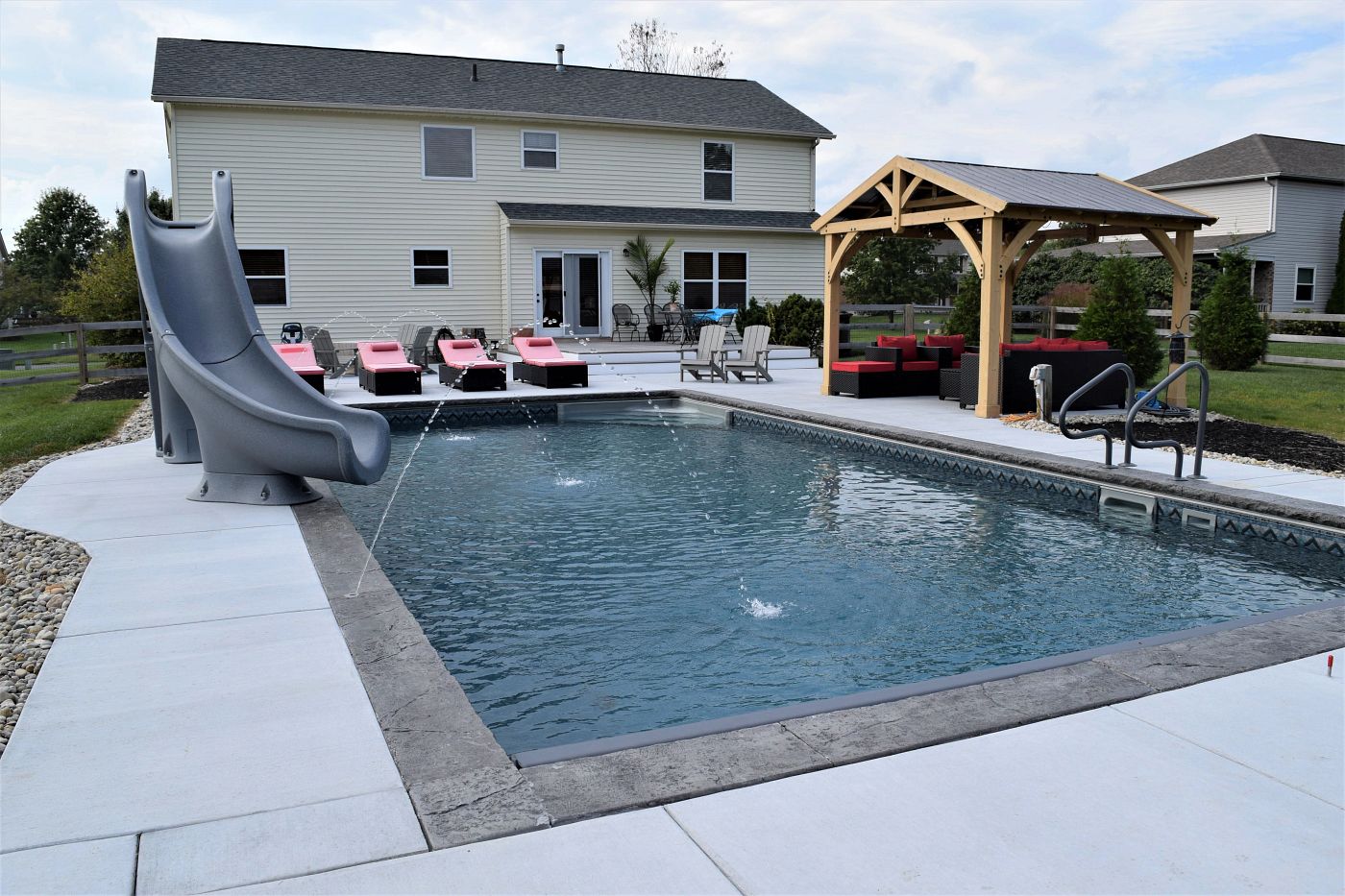
Installing Your Inground Pool in Massachusetts
Planning the pool of your dreams can be fun. But in order to make it happen, you have to pull yourself out of those daydreams of blissfully lounging poolside and consider the logistical aspects. The first step towards making your new pool a reality is to figure out when construction will need to begin.
You’ll want to connect with a licensed pool builder and come prepared with yard measurements, as well as an understanding of what permits (pool, electrical, etc.) may be required to begin. This can help you better inform your pool’s design. From there, a builder can assess your backyard and determine what’s needed to start breaking ground and get construction underway.
Given Massachusetts’ brutally cold winters, construction is typically a no-go between November and February – and possibly March – when the ground may be too cold to excavate or the threat of snowfall looms. Additionally, if you want your pool ready to give you relief from the hottest summer days, you may also want to give yourself a cushion of time to prepare for any unexpected circumstances, such as heavy rain or setbacks that can delay your pool installation schedule.
Another factor to consider is that Massachusetts can be quite hilly and western parts of the state have rocky terrain. Rocky, uneven backyards can require additional equipment and processes, including constructing a retaining wall and grading to level the ground.
Working with a licensed builder can help you better plan your pool project to account for unexpected hiccups and have your pool summer-ready!
Installing a Fiberglass Pool
Fiberglass pools offer a relatively speedy installation process, helping you get your pool up and running faster. Because fiberglass pool shells are manufactured off-site and then transported to your backyard, that shaves significant time off the installation process. However, it’s good to be prepared for some of the other aspects of installing a fiberglass pool to understand the path ahead!
Installing a Vinyl Pool
Before you can begin enjoying your gorgeous new vinyl liner pool, you have to contend with seeing your backyard dug up and your pool’s “ugly stage” before transforming into its final form as a beautiful swan. From measuring your backyard to sealing your vinyl liner in place, learn more about what you can expect throughout the vinyl liner pool installation process.
Pool Covers and Winterizing Options to Protect Your Pool
Whether you choose a fiberglass or vinyl liner pool, be sure to save room in your budget for a pool cover. Pool covers come with a variety of benefits that can help you save on energy costs, save time on maintenance, and also save lives. Because Massachusetts residents experience harsh winters and foliage-filled fall seasons, both an automatic pool cover and a specially-made winter pool cover can help protect your biggest backyard investment.
Winter Pool Covers vs. Autocovers: What to Choose For Your Massachusetts Pool
Pool covers can help you protect your pool, but there are some key differences between automatic pool covers and winter covers. Automatic pool covers are used during your regular pool season, from spring until fall. These covers can be activated with the touch of a button to help reduce water evaporation and prevent debris – and people or pets – from falling into your pool.
By contrast, winter covers are used to close your pool for the season. These covers are specially designed to fit your pool and protect it during colder months until it’s time to reopen for next year’s pool season.
Because Massachusetts sees some serious snowfall, pool owners should budget for both a winter cover in addition and an automatic pool cover. Massachusetts ranks among the Top 10 states for average annual snowfall in the U.S. Fitchburg, MA alone sees at least 82” per year, while Worcester and Lowell average above 60” of snow annually.
Given the heavy amounts of snow, a winter pool cover is a must for Massachusetts residents. While automatic pool covers can help make your pool safer and more energy-efficient, they aren’t made to support the weight of a heavy snowfall that could potentially compromise the delicate mechanics of an autocover.
During summer months, when you’re using your pool daily, automatic pool covers can help you save between 50% to 70% on energy costs. They can also reduce water evaporation and the need to rebalance your water chemistry.
For pool owners who continue to use their pools well into autumn (spoiler alert: a properly installed pool heater can help with that!), an autocover can help prevent MA’s famed fall foliage from finding its way into your pool.
Most importantly, autocovers can save lives, preventing kids and pets from accidentally falling in when your pool is unattended. An automatic pool cover can also help prevent uninvited guests from hopping your fence and using your pool unsupervised when you’re not around.
If you’re working with a smaller pool budget, keep in mind that many rectangular pool models are autocover-ready. More intricate shapes, such as freeform pools, may require a custom-cut autocover, which can cost more than a prefabricated cover.
How to Maintain Your Massachusetts Pool
Both vinyl liner and fiberglass pools are relatively easy to maintain, freeing up more time in your schedule to enjoy your pool instead of relentlessly tending to it. However, depending on the type of material you choose for your new pool, your maintenance calendar and checklist can vary in order to keep your pool beautiful and running properly.
Vinyl Liner Pool Maintenance
Although vinyl liner pools require slightly more maintenance than their fiberglass counterparts, the (slightly) extra effort is well worth it when it comes to their cost savings. Staying on top of weekly tasks, including testing your water’s chemical and pH levels and skimming, alongside periodic tasks like checking your liner for leaks, can go a long way towards keeping your pool clean, sparkling and a joy to use.
Although most vinyl liners can last for approximately 10 years, proper maintenance can help it last longer. To keep dirt and algae bloom at bay, give your vinyl liner a gentle weekly scrub with a soft brush. Making sure you only allow soft pool toys can also help prolong the life of your liner. Foam pool noodles, inflatable floats and beach balls can be great choices to keep the fun flowing and prevent your liner from accidentally getting punctured or damaged.
For more tips, download our vinyl liner maintenance checklist to help you keep your pool looking its best!
Fiberglass Pool Maintenance
The beauty of fiberglass pools is more than surface-deep. Not only are fiberglass pools easy on the eyes, they’re also easy to maintain. Once you get into a rhythm, staying on top of weekly and periodic fiberglass pool maintenance tasks is a breeze!
Each week, be sure to test your pool’s water chemistry, empty filter baskets and skim your pool. Monthly maintenance tasks can include checking your filter and back flushing your filtration system to keep your pump running smoothly.
Enjoying Massachusetts Pools Through the Seasons: Seasonal Pool Maintenance in MA
Although Bay Staters typically have fewer months to lounge poolside, there are a few ways to enjoy as much pool time as possible throughout the year. When planning your pool, consider adding a spillover spa or choosing a model with one already built-in. If you don’t have the budget for it right now, opting for a vinyl liner pool can keep the door open to add one later alongside a vinyl liner replacement or other renovations.
In addition to thinking about features that can help you extend pool season as long as possible, there are some seasonal aspects of keeping your pool in tip-top shape if you live in Massachusetts.
- Spring: Springtime in Massachusetts comes with beautiful scenery – and heavy pollen between April and May. (September is also another high pollen month for Bay State residents.) In addition to triggering allergies, pollen can clog your pool filter. Pollen grains can accumulate on the surface of your pool. Be sure to skim these tiny yellow or green granules out of your pool, as they can lead to algae.
- Fall: Although most Massachusetts residents typically close their pools in September, a heated pool can help you enjoy your pool until late October or early November. Other add-ons like a spillover spa or patio fire pit can help you enjoy your pool and backyard after the kids have gone back to school and temperatures start to chill out. And because over 62% of Massachusetts has tree coverage, Bay State pool owners should brace themselves to regularly skim any autumn leaves that fall into the pool. While an autocover can help prevent leaf accumulation, it’s still important to stay on top of fishing leaves out, as they can contribute to the development of algae growth.
- Winter: Many Massachusetts residents close their pools in September or October, although those with heated pools sometimes hold off until November. Regardless of when you chose to close your pool down before winter, there are a few basic tips to keep in mind. Be sure to remove all air from water lines and pool equipment. Although a lot of pool owners close their pool themselves, you can also enlist the aid of professionals to help you close and winterize your pool. Additionally, securing your pool with a winter cover can go a long way towards protecting it when winter snowstorms hit.
Massachusetts Inground Pool Costs
The total cost to install an inground pool in Massachusetts can vary based on a wide range of factors. Your pool’s size and materials are just one part of the equation. You’ll also want to consider the cost to install decking around your pool, as well as any features you may want to add. Due to Massachusetts’ cold winters and coastal positioning, accessories like a pool heater, spillover spa and pool lights are popular choices to help you wring every last drop of extended pool season from your purchase.
You’ll also want to reserve room in your budget for practical items that can help reduce maintenance and protect your pool, such as an automatic pool cover, a winter cover, and fencing that meets state and local regulations. Massachusetts state building codes require that all residential pools must be surrounded by a fence or barrier at least 4 feet high with self-closing gates secured with a lock or self–latch. Any locking apparatus must be situated at least 4 feet from the ground to prevent small children from accessing the pool.
Many homeowners believe that the cost of owning a pool can put that dream out of reach. Although purchasing a pool can be expensive, there are a variety of financing options available to help you achieve the dream of owning your own pool.
Rules and Regulations for Installing an Inground Pool in Massachusetts
If you live in Massachusetts and are planning on owning a pool, brush up on your state and local laws around pool ownership to be sure your pool is compliant with all regulations.
Because state and local laws can change over time, it’s important to conduct your research before breaking ground on your beautiful new pool. Although there are overarching pool laws for the entire state of Massachusetts, your city, town or municipality may have additional, potentially stricter regulations governing pool ownership. Check with your local building office to gain a better understanding of what you may be responsible for. Additionally, working with a professional builder can help you more easily navigate the most recent codes, as well as help you secure the proper permits to build your new pool.
That said, here are some of the more common questions we hear around legal responsibilities and requirements to owning a pool in Massachusetts.
How far does a pool need to be from the house in Massachusetts?
The distance between a swimming pool and a home varies throughout the state. Different cities and towns have their own requirements as to what’s appropriate. For instance, Middleton, MA requires that a “pool and any structural deck shall be located a minimum of 12 feet from the home, 20 feet from the side and rear of the property lines and 25 feet from the front property line.”
Other Massachusetts towns have less stringent requirements. For example, Agawam, MA only requires that a pool must be a minimum of 10 feet from the side yard property line and 10 feet from the rear yard property line. Boston has even more relaxed rules around how far a pool must be situated from a property, requiring that a pool must be at least 4 feet from every lot line. However, despite Boston requiring less distance between a pool and a property, its pool fence and barrier laws are stricter, requiring fencing to be at least 6 feet high as opposed to the statewide minimum of 4 feet high.
Be sure to check with your local building office to confirm how far your pool needs to be from your home and any other property lines. Because Massachusetts is home to cities and towns of varying sizes and population densities, your local distance requirements may be relative to the average parcel of land and property sizes. Urban areas may require a shorter distance, while more rural and suburban areas may insist upon a greater distance between your pool and property lines. A licensed professional pool builder can help you better understand any requirements for your area.
Do I have to have a fence around my pool in Massachusetts?
Yes, if you plan on owning a pool in MA, the state requires that all residential pools must be surrounded by a fence or barrier of at least 4 feet high. Individual cities and towns throughout the state may have stricter requirements as to how high a pool fence must be in order for your pool to comply with local building codes.
How tall does a fence around a pool have to be in Massachusetts?
In Massachusetts, state law and building codes require a pool fence or barrier at least 4 feet high. In addition, fencing must have self-closing, self-latching gates. Any latches must be placed at a height of at least 4 feet to prevent kids from opening the gate and accessing the pool without supervision.
While Massachusetts requires that all residential pools must be surrounded by a fence or barrier at least 4 feet high on all sides, cities and towns throughout the state may have more stringent requirements. For instance, Boston, MA requires that all pool fencing must be at least 6 feet high. Be sure to check with your local building office around any fencing and pool requirements to ensure your pool is up-to-code. Working with a licensed professional pool builder can help you more easily navigate these codes and better understand state and local regulations.
Massachusetts Pool FAQs
What type of inground pool is best for Massachusetts?
Both fiberglass pools and vinyl liner pools have their merits as outstanding choices for Massachusetts residents craving a pool. Although both are relatively low-maintenance choices, fiberglass pools are beloved for their smooth finish and ease of installation. Because Massachusetts residents have a shorter pool season given their harsh winters, a prefabricated fiberglass pool shell can decrease the installation timeline, helping you get your pool up and running sooner and giving you more time to spend in your beautiful new pool.
Vinyl liner pools are another great – and affordable – option that offers just as many benefits. While they require slightly more upkeep than fiberglass pools, they’re still a breeze to maintain.
Not sure which option is right for you? Chat with a builder who can help you understand your options and find a pool you’ll love for years to come.
Does a pool add value to homes in Massachusetts?
Massachusetts sits among the Top 10 states for pool ownership, with a whopping 228,000 pools scattered throughout the Bay State, according to Angi. Overall, adding a pool can increase your home’s resale value between 5% and 8%, making your home more attractive to new buyers craving a ready-made oasis in their backyard. Even if you aren’t planning to sell your home in the immediate future, adding a pool gives you a place to have fun and gather with friends and family through the years.
Massachusetts Inground Pool Installation Areas
If you live in Massachusetts and are thinking of buying a pool, Latham is here to help. With over 65 years in business, we’ve helped countless homeowners throughout the Baked Bean State build the pool of their dreams, including those in:
- Boston, MA
- New Bedford, MA
- Oaks Bluffs, MA
- Brockton, MA
- North Pembroke, MA
- Southborough, MA
- Worcester, MA
- South Barre, MA
- Leominster, MA
- Westminster, MA
- Lowell, MA
Start Building a Pool for Your Massachusetts Backyard Today
A new pool can give your backyard even more character and help you make countless memories with loved ones. Join the thousands of happy Massachusetts customers who love their Latham pool and speak with an expert builder today to make the pool of your dreams a reality.
Contact us to learn more today.

